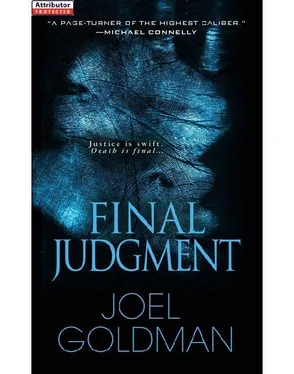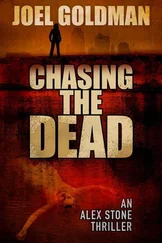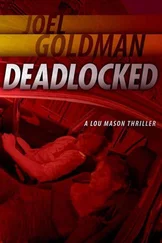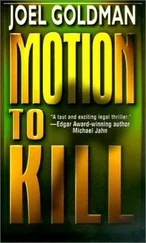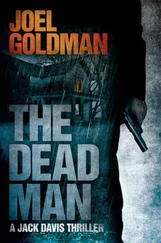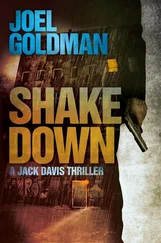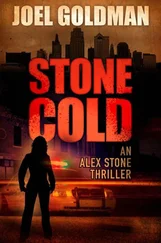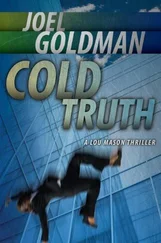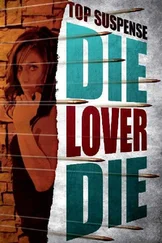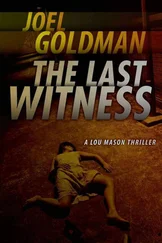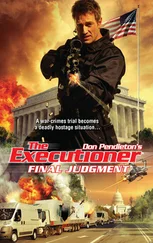Joel Goldman - Final judgment
Здесь есть возможность читать онлайн «Joel Goldman - Final judgment» весь текст электронной книги совершенно бесплатно (целиком полную версию без сокращений). В некоторых случаях можно слушать аудио, скачать через торрент в формате fb2 и присутствует краткое содержание. Жанр: Криминальный детектив, на английском языке. Описание произведения, (предисловие) а так же отзывы посетителей доступны на портале библиотеки ЛибКат.
- Название:Final judgment
- Автор:
- Жанр:
- Год:неизвестен
- ISBN:нет данных
- Рейтинг книги:3 / 5. Голосов: 1
-
Избранное:Добавить в избранное
- Отзывы:
-
Ваша оценка:
- 60
- 1
- 2
- 3
- 4
- 5
Final judgment: краткое содержание, описание и аннотация
Предлагаем к чтению аннотацию, описание, краткое содержание или предисловие (зависит от того, что написал сам автор книги «Final judgment»). Если вы не нашли необходимую информацию о книге — напишите в комментариях, мы постараемся отыскать её.
Final judgment — читать онлайн бесплатно полную книгу (весь текст) целиком
Ниже представлен текст книги, разбитый по страницам. Система сохранения места последней прочитанной страницы, позволяет с удобством читать онлайн бесплатно книгу «Final judgment», без необходимости каждый раз заново искать на чём Вы остановились. Поставьте закладку, и сможете в любой момент перейти на страницу, на которой закончили чтение.
Интервал:
Закладка:
Timing was everything. Al Webb had given a CD to Lari Prillman to hide in her safe at the same time she was defending him and Rockley in Carol Hill’s lawsuit. Turning the corner from Forty-seventh Street onto Broadway, Mason realized that timing was everything unless the timing didn’t work. Vanessa Carter had been blackmailed after the arbitration had ended but before someone had broken into Lari Prillman’s safe and stolen the CD.
Lari had told him that Al Webb had given her the CD for safekeeping at the outset of the hearing and that she hadn’t taken it out of her safe since then. If she was the only one with the combination, how did the blackmailer get it out of the safe to use it in the phone call with Vanessa Carter, and why would the blackmailer have put it back in the safe?
The most logical answers to those questions were that Lari Prillman had lied to him and that she was involved in the blackmail scheme. Mason wondered whether she hated the prospect of losing the case enough to blackmail the judge. Vanessa Carter had told him that the blackmailer was a man. Lari could have used a device to change her voice. Or, maybe the blackmailer was working for her.
He reconsidered the burglary, remembering how cavalier Lari had been when they arrived at her office and found the door unlocked. She hadn’t hesitated to walk in and would have continued down the hall into the arms of the thief if he hadn’t stopped her. Perhaps she knew there was nothing to be afraid of even when the shooting started, though her post-traumatic stress had seemed genuine.
The thief knew about the CD and that it was kept in the safe. The thief was able to pick the lock on the office door, crack the safe, and shoot in the dark well enough to scare but not kill him and Lari. He made a mental list of likely burglars. There weren’t many who fit that job description.
Al Webb knew about the CD but didn’t strike Mason as having the necessary skill set to pull off the job, although he didn’t have to be a second-story man. Webb had sat next to Lari at the Republican Party dinner the night of the break-in. He’d left early. Lari could have given him the key to her office and the combination to her safe. If she had, she wouldn’t have taken Mason to her office until she was certain Webb was gone. If she’d simply screwed up their timing, Webb could have come up with a more graceful exit strategy than attempted murder.
Vince Bongiovanni knew about Fiori’s tapes and may have known that Lila Collins had kept some of them for her own use, copying them onto CDs as he had. Assuming that Bongiovanni was willing and able to steal the CD, he would have blackmailed the judge to rule for his client, not against her.
Dennis Brewer was the only person Mason could think of who could have pulled off the robbery, especially after Mason and Lari interrupted him. Maybe there was more on the CD than the conversation between Fiori and Mason. Maybe Brewer was being blackmailed as well. Otherwise, Brewer would have just gotten a search warrant. Mason added another item to his to-do list: Check out a connection between Brewer and Fiori.
While he was at it, he’d try to answer a few other questions that kept rolling around inside his head. The FBI had intercepted an e-mail with the picture of Blues outside Rockley’s apartment attached to it. Who had sent the e-mail and who had been the intended recipient? Why did Johnny Keegan have Mason’s name and phone number on him when he was killed? Why did Rockley’s killer choose Fish’s car? What was so important about the outcome of Carol Hill’s case that was worth the risk of blackmailing Judge Carter?
Mason had sought answers to these questions from Detectives Griswold and Cates, Samantha Greer, Kelly Holt, Carol Hill, Mark Hill, Vince Bongiovanni, Al Webb, and Lari Prillman. He’d been stonewalled, lied to, or duped with half-truths and artful omissions. All of which meant one thing. He had yet to talk to the right person, someone he could dupe with half-truths and artful omissions. Lila Collins was his last chance.
FIFTY-SEVEN
Mason stopped for a moment as he reached the top of the back stairs to the second floor above Blues on Broadway. There were three offices along the hallway. Blues used the one to Mason’s right. The door was open, the office empty. The lights were on, Coltrane humming in the background.
Mickey Shanahan had lived in the office on the other side of the hall until Abby had lured him to Washington, D.C. He had originally rented the space for his own public relations firm, which had proved to be more fantasy than fact. Blues let him work off the rent by tending bar until Mason put him to work. The door to that office was propped open by a suitcase. Mickey was back but nowhere in sight.
Mason’s office was at the end of the hall, the door closed. The mail slot in the center of the door, usually stuffed by this time of day, was empty. Mickey was probably sitting behind Mason’s desk, feet up, balancing the day’s take-in fees against the bills marked Past Due. Mason picked up his stride, pushed open the door to his office, and stopped, rooted to the spot.
Mickey was seated behind Mason’s desk, though his feet were firmly on the floor, the unopened mail piled in front of him. Blues stood behind him, watching the traffic on Broadway. Both men looked up, though they offered neither a greeting nor an outstretched hand. Their faces were silent and long, their eyes now aimed at the woman sitting in the chair opposite Mickey, her back to Mason.
He recognized Vanessa Carter’s erect bearing even before she rose and turned around. She removed the dark glasses she was wearing, revealing a purpled right eye swollen half shut.
“We are running out of time,” she said.
“Who did this?” Mason asked, taking two steps toward her.
“I don’t know. He was waiting for me inside my garage when I came home last night. He’d unscrewed the lightbulbs. It was dark. I didn’t see anything. He grabbed me, hit me, and told me.”
“Told you what?” Mason asked.
“That I was running out of time.”
Wounds inflicted by guns, knives, or bare hands eventually healed, scars the last remnants. The wound that often didn’t heal was to the psyche, to that inner sanctum where people took refuge from the vagaries of a harsh and uncertain world; fear of another attack became a daily rite marked by a tremor or a tic. Vanessa Carter was no different. The tic had wormed its way into her cheek, her facial muscles twitching like she’d been short-circuited.
“Did you call the police?”
She clenched her hands together, pressing them against her middle, biting the words. “We both know I can’t do that. You have to stop this.”
Mason looked at Blues and Mickey, searching them for answers, finding none. He took a breath. “I’m working on it.”
It wasn’t a lie, but it wasn’t the truth either because the statement implied that he was making progress or that he had a plan; that a solution was in sight. None of that was true. Instead, the walls were coming down around him-and her-and he had no better idea of what to do about it than to sacrifice himself, an option that had as much appeal as throwing a virgin into a volcano to keep it from erupting.
“I can keep an eye out,” Blues volunteered.
Judge Carter looked back at him, a tremor creeping into her voice. “I would appreciate that. I’ll be at home until this is over.”
It was another concession to her circumstance that she made reluctantly, her pride in being self-sufficient another casualty. She walked slowly down the hall, disappearing one step at a time.
Mason wiped his dry erase board clean, laying out the facts as much for him and Blues as for Mickey. Taking it from the beginning forced him to organize the story chronologically, highlighting the gaps in what they knew and underscoring the questions that had to be answered.
Читать дальшеИнтервал:
Закладка:
Похожие книги на «Final judgment»
Представляем Вашему вниманию похожие книги на «Final judgment» списком для выбора. Мы отобрали схожую по названию и смыслу литературу в надежде предоставить читателям больше вариантов отыскать новые, интересные, ещё непрочитанные произведения.
Обсуждение, отзывы о книге «Final judgment» и просто собственные мнения читателей. Оставьте ваши комментарии, напишите, что Вы думаете о произведении, его смысле или главных героях. Укажите что конкретно понравилось, а что нет, и почему Вы так считаете.
